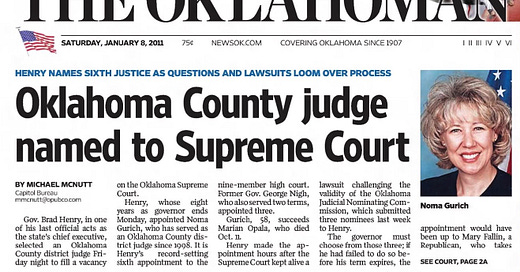What You Need to Know About the Appellate Judges on This Year's General Election Ballot
This year's Oklahoma general election electorate is more prepared than any in recent history to render an informed verdict on Oklahoma's judges.
It's being said that this is the first national election where independent media will have a greater impact than the corporate media.
I think that's a good analysis.
And, I am optimistic that in future elections, not only will this be the case for national-level elections, but it will also be the case for state-level elections as well.
No longer will the l…
Keep reading with a 7-day free trial
Subscribe to The Oklahoma State Capital to keep reading this post and get 7 days of free access to the full post archives.




